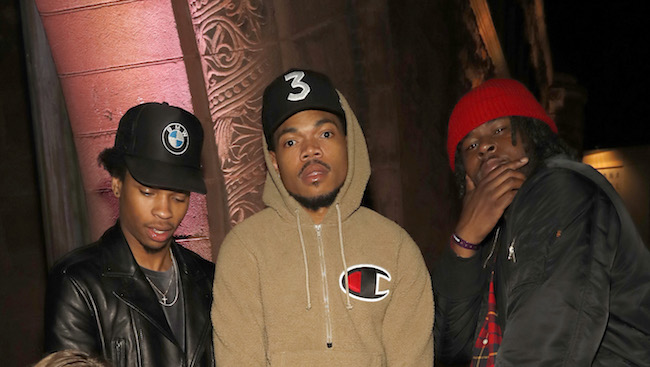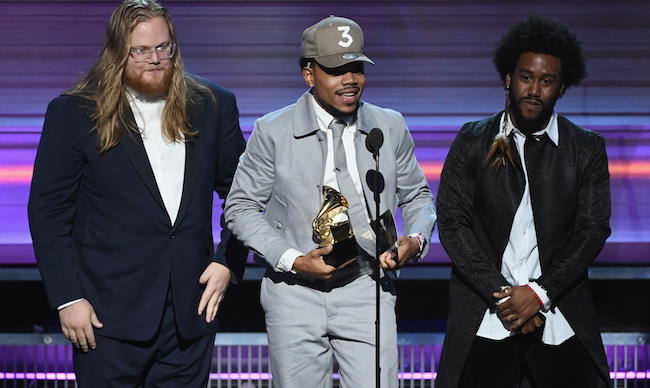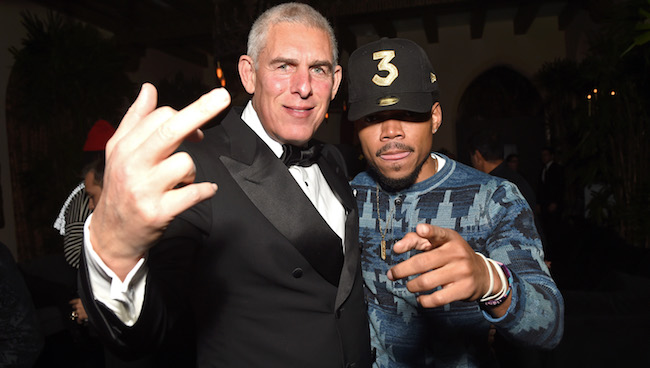
Things change, that’s just how the world works, and the longer something goes on the more likely it is to experience some sort of change. It was three, long years ago when Chance The Rapper told Rolling Stone “I might not ever drop a for-sale project” and the word “might” and the future just about ensured that would indeed change. No matter how strong Chance’s morals are and how altruistic and good natured his intentions were, the chances — no pun intended — always were he would eventually charge something for his music.
So, when Chance told Complex “I think I might actually sell this album,” earlier this week, it should not have been a surprise to anybody. At the end of the day the music business is exactly that, a business, and the easiest way to make money off music is to sell it. As his profile continued to grow — and it has been skyrocketing — this was always where things were headed. Someone, whether it’s Chance himself, or a corporation, or some other outside force — was always going to want to capitalize on his growing popularity, and not just with concert and merchandise sales. To truly and maximize Chance’s earning potential everything was going to need a price tag, including the songs the world so lovingly covets.
But, why now?

The simplest answer is that now, with Chance the crowned prince of the industry at the Grammys, it’s time to capitalize, even if he seems to have done that some already with a sold-out arena tour this spring and summer. The easiest place to point when dishing out responsibility is probably Apple. For all of Chance’s talk of independence, he’s at least in business with Apple in some way, releasing his last two projects on their streaming service Apple Music first, with windows of exclusivity. Maybe the company has decided it was time to capitalize, and try to squeeze a few more dollars out of the partnership with actual sales. New subscribers have been their golden egg thus far, with artists like Drake and The Weekend providing subscriber bumps so large each time they release music that it nets the company tens of millions of dollars a month.
If Chance doesn’t move the needle that much — and that’s likely even after the trifecta of Grammys he won this year — the company could have decided that record sales is a good place to make up the difference in valuation between Chance’s next project and Drake’s. The industry chatter around Drake’s More Life says Apple is expecting at least 1,000,000 new subscribers thanks to Drake’s new album, a number that would earn them $20,000,000 in just two months, completely recouping the reported $19 million they gave him in 2015.
But with those Grammys in tow, and with his profile as high as ever, Chance also has more leverage than ever, and budging on his stance now due to pressure from Apple just doesn’t fit his previous tendencies. If anything, now he has the weight to actually demand something from Apple, and is in a better position than ever to refuse their demands. It wouldn’t make sense for him to succumb to the pressure of Apple now, and with Apple already reaping the benefits there’s no reason for them to rock the boat with an ultimatum that goes against the previously stated ideals of an industry darling that has generously bestowed them a place in his ecosystem.
Chance’s progression through the industry has been unorthodox. Typically, a crowning moment at the Grammys is the result of a healthy amount of record sales to supplement the rousing critical success of an album. For Chance, with all his keen decision making and his stubbornness towards the industry, he managed to skip one of those vital steps, but it was only natural he’d eventually take that step, even if begrudgingly so.
It doesn’t mean he’s selling out or budging on his morals and standards. In fact, it’s the complete opposite. As his contemporaries like Lil Yachty anoint him a flag bearer for new artists in the current climate of selling music vs. giving it away and digital product vs. physical product, this is all just another opportunity for Chance to push forward his agenda of independence.
In the same Rolling Stone interview where he opined that he might not sell music, ever, he also combated the standard of what an album truly is, asking “Does the music business side of this dictate what type of project this is?” For years rap has blurred the lines of what is a mixtape and what’s an actual album, forcing fans to lean on the term “project” just to not confuse the identifiers. Time and time again rappers handed out free projects full of original music, leaving the world to label it an album, a mixtape or something in between. Even back then Chance was questioning the entire process, wondering “If it’s all original music and it’s got this much emotion around it and it connects this way with this many people, is it a mixtape? What’s an album these days, anyways?”
With all of the success both commercially and on the award show circuit for Coloring Book, those definitions are shattered. Album or mixtape, Chance’s project was hailed, rewarded and consumed and suddenly it doesn’t matter wha you call your group of songs anymore, it can collect plaques and chart on Billboard, it can win Grammys and it can make it to fans ears and get them to show up to concerts.
By maybe selling the next one, it continues to shatter that standard. If he doesn’t sign with some record label, it’ll be completely independent — even with the Apple partnership — and exist in its own space. Without a label to house it it’s not a full major-label debut, but being original music it’s not a mixtape or a FreeP or any of the other phrases used to label a free project. And yes, Chance made sure to call whatever is next an “album” while in conversation with Complex, noting that it would differ from his previous works and be an “album” because he was “opening the scope,” but it’s just a distinction, like all of the other identifiers. It won’t differ, in that it’s the new series of songs grouped together by Chance, just like Acid Rap wasn’t lesser than an album because he called it a mixtape, this new project won’t be more than a mixtape because he adds a price to it.
By simply existing, Chance’s next release is proof that “Soundcloud rappers” can elevate up to superstar status and be worthy of $10 a pop support. Yes, Chance is breaking down doors for artists in a new generation of music consuming, and this is just another one of them. Really, by changing his idea about whether or not his music should be free, he’s making his most daring move yet — and it should be appreciated as such.

In the end, the answer to the question at hand is probably the simplest and most practical: Chance is simply too big now to be a free artist. Hate it or love it, Chance has reached that tipping point where diehard and day one fans start complaining about how their favorite artist has changed and gone mainstream. That point when their favorite little artist that could becomes the artist that can and does. Much like The Weeknd before him, Chance went from a shadowy figure and an industry darling with plenty of DIY charm to a bonafide pop star, capable of carrying his own arena tour and selling out venues all over the world at a moment’s notice. Chance is upper echelon, and as such his music is valuable and deserving of our $10. Given how supportive his fans have been thus far, they’ll happily shell that out if and when the time comes to do so. Given how often he gives right back to that same fanbase, this shouldn’t be too much to ask at all.
Honestly, he deserves that much, handing out debated classics like Acid Rap and Grammy-winning albums like Coloring Book is a favor literally no artist has ever pulled off for their fans. And if that means Chance changed his mind, or switched up on fans, or broke some promise he made full of naiveté a lifetime ago? So what. Jay Z said it best in his legendary, impromptu Hot 97 over — ironically so considering how it relates to Chance now — the “Grammy Family” beat: “Everybody look at you strange, say you changed / Like you work that hard to stay the same.”
Chance has been working damn hard, and it’s time to cash in.






